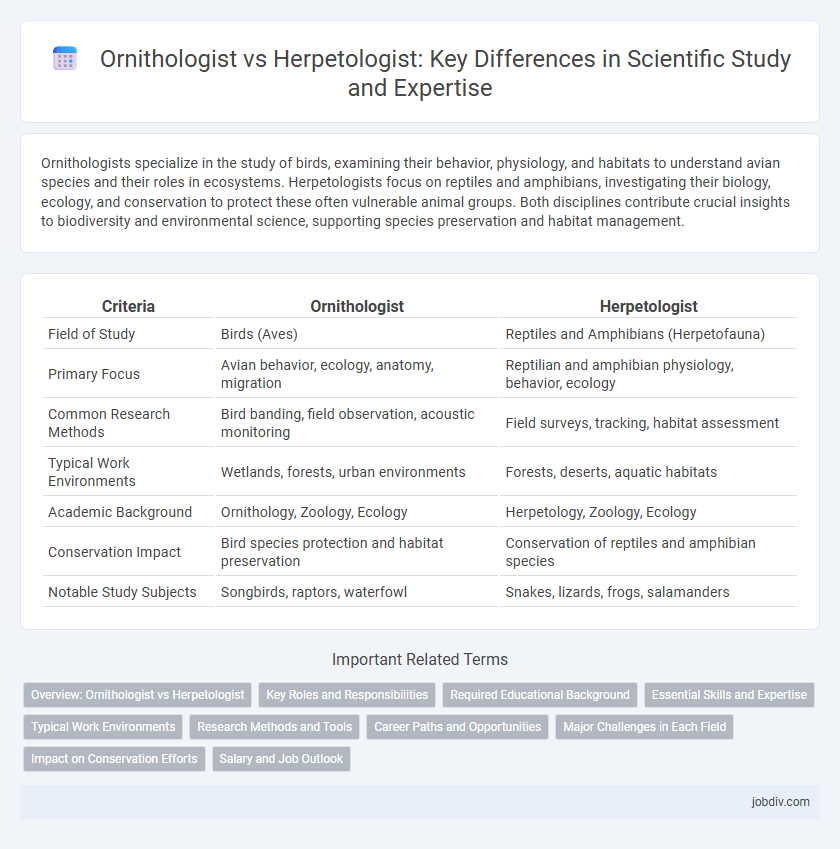Ornithologists specialize in the study of birds, examining their behavior, physiology, and habitats to understand avian species and their roles in ecosystems. Herpetologists focus on reptiles and amphibians, investigating their biology, ecology, and conservation to protect these often vulnerable animal groups. Both disciplines contribute crucial insights to biodiversity and environmental science, supporting species preservation and habitat management.
Table of Comparison
| Criteria | Ornithologist | Herpetologist |
|---|---|---|
| Field of Study | Birds (Aves) | Reptiles and Amphibians (Herpetofauna) |
| Primary Focus | Avian behavior, ecology, anatomy, migration | Reptilian and amphibian physiology, behavior, ecology |
| Common Research Methods | Bird banding, field observation, acoustic monitoring | Field surveys, tracking, habitat assessment |
| Typical Work Environments | Wetlands, forests, urban environments | Forests, deserts, aquatic habitats |
| Academic Background | Ornithology, Zoology, Ecology | Herpetology, Zoology, Ecology |
| Conservation Impact | Bird species protection and habitat preservation | Conservation of reptiles and amphibian species |
| Notable Study Subjects | Songbirds, raptors, waterfowl | Snakes, lizards, frogs, salamanders |
Overview: Ornithologist vs Herpetologist
Ornithologists specialize in the study of birds, focusing on their behavior, physiology, and ecology, while herpetologists concentrate on reptiles and amphibians, examining species diversity, habitat, and conservation. Both fields employ observational research and fieldwork but target distinct animal classes within vertebrate zoology. Expertise in ornithology involves avian anatomy and migration patterns, whereas herpetology emphasizes evolutionary biology and environmental adaptation of herpetofauna.
Key Roles and Responsibilities
Ornithologists specialize in studying avian species' behavior, physiology, and ecology, often conducting field research, population monitoring, and habitat conservation efforts. Herpetologists focus on reptiles and amphibians, analyzing their life cycles, environmental interactions, and disease impacts, with responsibilities that include species identification, captive breeding programs, and ecological assessments. Both professions play critical roles in biodiversity conservation, data collection for environmental policy, and advancing scientific understanding of vertebrate animals.
Required Educational Background
Ornithologists typically require a bachelor's degree in biology, zoology, or ecology, often followed by specialized graduate studies focusing on avian species, bird behavior, and ecology. Herpetologists usually pursue a similar educational path, earning degrees in biology or zoology with advanced coursework and research emphasizing reptiles and amphibians. Both fields benefit from hands-on field experience and internships to develop species-specific knowledge and research skills.
Essential Skills and Expertise
Ornithologists specialize in studying birds, requiring skills in avian identification, bird behavior analysis, and expertise in field observation techniques. Herpetologists focus on reptiles and amphibians, demanding proficiency in species identification, habitat assessment, and knowledge of herpetofauna ecology. Both disciplines necessitate strong analytical skills, data collection methods, and a deep understanding of animal biology and environmental interactions.
Typical Work Environments
Ornithologists primarily conduct research in diverse habitats such as forests, wetlands, and coastal areas to study bird behavior, migration patterns, and ecology. Herpetologists often work in similar field environments, including tropical rainforests, deserts, and freshwater ecosystems, focusing on reptiles and amphibians' biology and conservation. Both specialists commonly utilize laboratories and research institutions for data analysis, specimen examination, and ecological modeling.
Research Methods and Tools
Ornithologists employ techniques such as bird banding, acoustic monitoring, and remote sensing to study avian behavior and migration patterns, utilizing tools like mist nets, GPS trackers, and sound recorders. Herpetologists use visual encounter surveys, pitfall traps, and telemetry to investigate reptiles and amphibians, relying on equipment including temperature data loggers, radio transmitters, and environmental DNA (eDNA) sampling kits. Both disciplines integrate field observations with laboratory analysis, but their research methods are adapted to the specific ecological and physiological traits of birds versus herpetofauna.
Career Paths and Opportunities
Ornithologists specialize in the study of birds, focusing on their behavior, ecology, and conservation, with career opportunities in research institutions, wildlife organizations, and environmental consulting. Herpetologists concentrate on reptiles and amphibians, contributing to habitat preservation, disease management, and species monitoring, often finding roles in academia, zoos, and government agencies. Both fields offer unique research prospects but differ in species focus and applicable conservation challenges, influencing career trajectory and specialization.
Major Challenges in Each Field
Ornithologists face major challenges such as tracking migratory bird patterns affected by climate change and habitat loss, requiring advanced telemetry and long-term ecological monitoring. Herpetologists encounter difficulties in studying elusive amphibians and reptiles, often limited by their cryptic behavior and declining populations due to disease outbreaks like chytridiomycosis. Both fields demand innovative conservation strategies and interdisciplinary research to address species vulnerability and environmental threats.
Impact on Conservation Efforts
Ornithologists contribute to conservation by studying bird populations, migration patterns, and habitat requirements, informing policies that protect avian biodiversity. Herpetologists focus on reptiles and amphibians, addressing threats like habitat loss, climate change, and disease, which are critical for maintaining ecosystem health and preventing species extinction. Both fields provide essential data that guide habitat restoration, species protection laws, and biodiversity monitoring programs globally.
Salary and Job Outlook
Ornithologists typically earn an average salary ranging from $50,000 to $80,000 annually, reflecting demand in ecological research and conservation projects. Herpetologists see comparable salary ranges but with slightly higher variability due to specialized roles in endocrinology and toxin research, often between $45,000 and $85,000 per year. Job outlook for ornithologists is projected to grow by approximately 6% through 2030, while herpetologists face a steadier growth rate near 4%, influenced by habitat preservation and climate change studies.
Ornithologist vs Herpetologist Infographic

 jobdiv.com
jobdiv.com